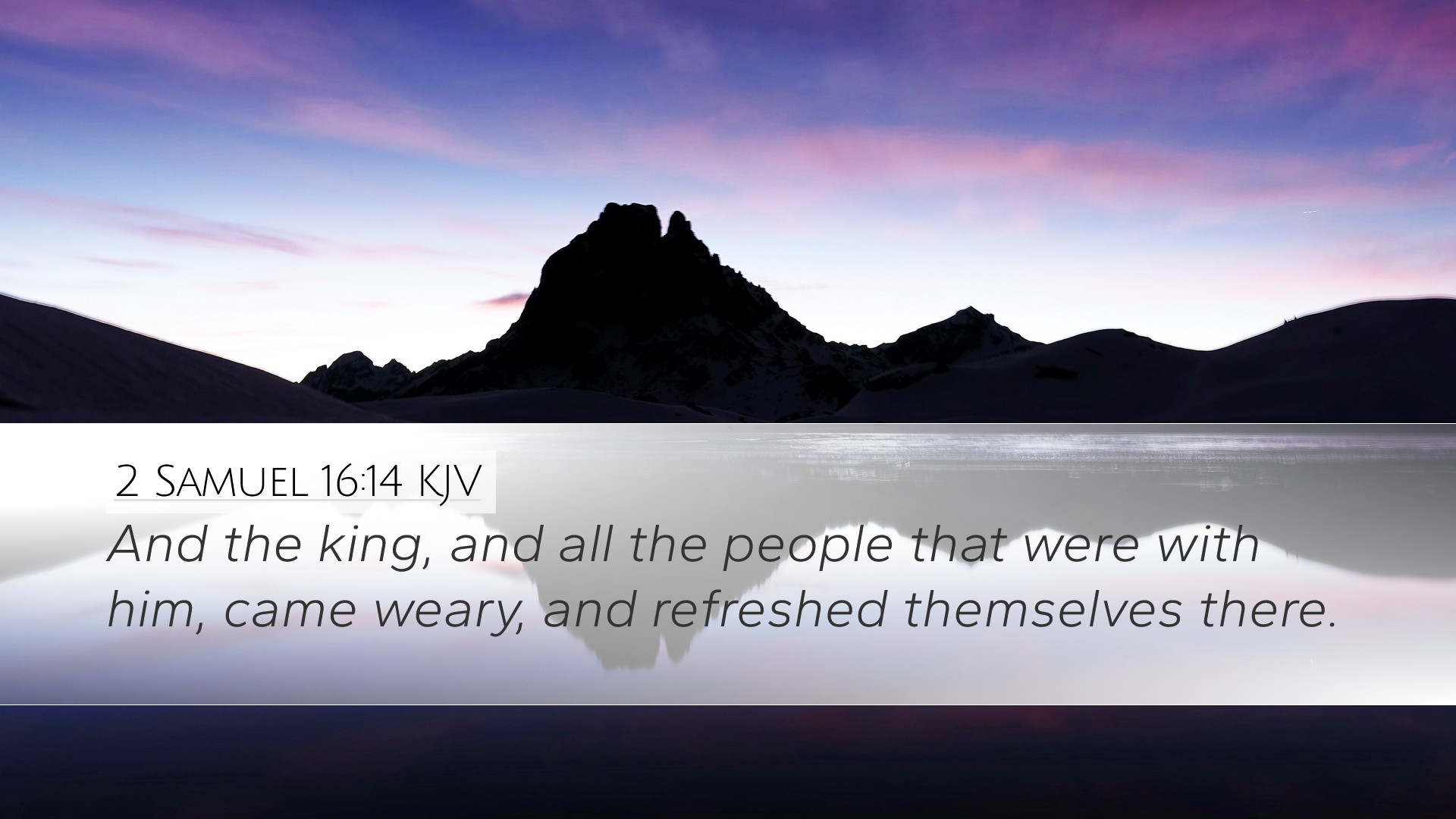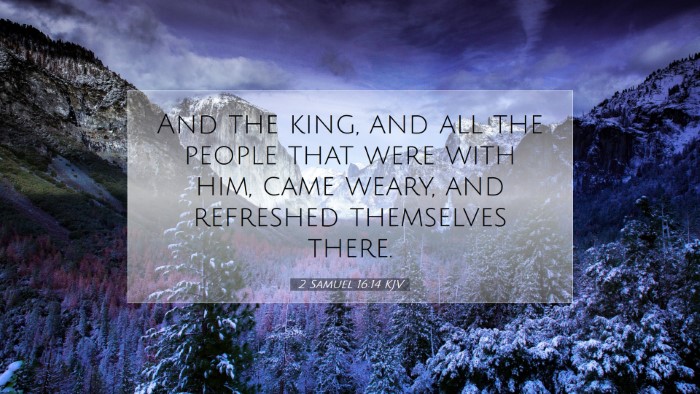Commentary on 2 Samuel 16:14
2 Samuel 16:14 states: “And the king and all the people that were with him came weary, and refreshed themselves there.” This passage occurs during David’s flight from Absalom, highlighting the weariness of the king and his followers amidst tumultuous times.
Contextual Background
This verse is set against a backdrop of rebellion and turmoil in Israel. Absalom's coup had forced David to flee Jerusalem, a situation that would undoubtedly weigh heavily upon him. The exhaustion faced by David and his supporters not only reflects their physical state but also their spiritual and emotional burdens.
Historical Significance
The historical context is crucial in understanding the trials that the king faced. During this period, David dealt with betrayal, familial conflict, and national upheaval. The weariness mentioned in the text can be seen as both a literal fatigue from travel and a metaphorical representation of the stress and anxiety brought on by the coup.
Insights from Public Domain Commentaries
Matthew Henry
Matthew Henry emphasizes the profound weariness of David. He notes that this weariness is not just physical but also reflects the spirit of a leader faced with overwhelming challenges. Henry highlights that David, as a man after God’s own heart, still faced trials. His need for refreshment indicates a vital aspect of leadership: the acknowledgment of human limitations. Henry mentions that the tired king ultimately found refuge and refreshing in the wilderness, which can symbolize God's provision even in the darkest hours.
Albert Barnes
Albert Barnes adds to this discussion by suggesting that David’s weariness symbolizes a broader theme of struggle faced by believers. He interprets the passage to show that in times of distress, the faithful can turn to God for renewal and strength. Barnes comments on the need for rest and spiritual refreshment during times of trial, encouraging leaders to seek moments of solitude and communion with God, especially during difficult periods.
Adam Clarke
Adam Clarke offers a detailed examination of the term "refreshed." He delves into the Hebrew translation, which indicates both physical and spiritual revitalization. Clarke asserts that this refreshment is a divine gift, suggesting that in moments of despair, God often provides sustenance, both for the body and soul. He encourages readers to view this verse as a reminder of God’s ability to renew one's strength. Clarke highlights that even during periods of disorder, Richmond is accessible through faith and seeking God's presence.
Theological Reflections
This verse invites deep theological reflections regarding the nature of God’s sustenance. It calls upon pastors and theologians to help their congregations recognize that weariness in the Christian walk can be a pathway to reliance on divine strength. Moments of fatigue can lead believers to a fresh encounter with God, ultimately resulting in a renewed spirit.
Prayer and Restoration
The theme of prayer becomes salient here. David’s journey reminds us of the importance of bringing our weariness and burdens before God. In prayer, believers can find solace and support, illustrating that spiritual refreshment is a process often initiated in communion with God.
Community Support
Moreover, this passage emphasizes the necessity of community among believers. Just as David and his followers faced their trials together, the church today must support one another in weariness. Pastors, students, and scholars can examine how congregations offer encouragement and collective refreshment in challenging times.
Practical Applications
- Encouragement in Trials: Encourage believers to share their burdens within the community, promoting a culture of openness and support.
- Importance of Rest: Highlight the value of physical and spiritual rest as integral to health and leadership.
- Seeking Divine Refreshment: Teach about the fundamental need for prayer and reliance on God during tough seasons.
- Collective Worship: Create opportunities for communal worship that can serve as a refreshment for wearied souls.
Conclusion
2 Samuel 16:14 serves as a poignant reminder of the challenges faced by leaders and believers alike. Through the insights of eminent commentators, we gain a deeper understanding of weariness, refreshment, and the undeniable presence of God in our fatigued states. This verse beckons each of us, whether in ministry or study, to acknowledge our weariness, seek refreshment from God, and uplift one another in communal support. It is in these moments of despair that God’s providence shines most brightly, making every weary soul ultimately capable of renewal and strength.


